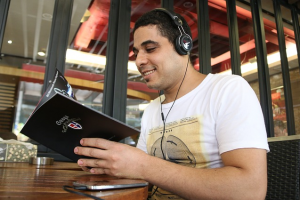 QUEZON City, Philippines (September 9) – “Music is life” that’s what they say. Almost all of what with do is connected to sounds. Anything we do creates sounds.
QUEZON City, Philippines (September 9) – “Music is life” that’s what they say. Almost all of what with do is connected to sounds. Anything we do creates sounds.
That’s why the term “Music” was invented.
Not only was the term invented but almost simultaneously, different instruments for making sound were also developed. Music is an art form whose medium is sound and silence. Generally, a song is considered the smallest stand alone work of music, especially when involving singing. The common elements of music are pitch (which governs melody and harmony), rhythm (and its associated concepts tempo, meter, and articulation), dynamics, and the sonic qualities of timbre and texture. The word derives from Greek μουσική (mousike; “art of the Muses”) In its most general form, the activities describing music as an art form include the production of works of music, the criticism of music, the study of the history of music, and the aesthetic dissemination of music.
 When it comes to studying, music is also important because it helps us be motivated while studying. Here are some advantages while listening to music while studying:
When it comes to studying, music is also important because it helps us be motivated while studying. Here are some advantages while listening to music while studying:
- It can make us feel relieve.
Sometimes when you feel bored or not in mood, listening to music helps us feel relief. It also helps in reducing stress and helps us fall fast asleep. It also serves as a therapy in anger management sessions.
- Music can make us feel comfortable.
Music, especially the melody found in love songs or romantic music, helps you feel like you are dreaming and flying above the clouds, giving you the feeling of being happy all of the time.
- Music also can enhance and help us practice our English language skills especially when you are singing because you exercise yourself to speak in English in different way. Of course, this is only applicable to English songs.
 Studies have shown that listening to the right kind of music may help ease your mind & help you concentrate. One study that was done shows that listening to music from the classical composer Mozart can help with your short-term concentration and can improve your performance on certain tasks – this is called the “Mozart effect.” Another study showed that music engages certain areas of the brain, asserting it to pay attention and preventing you from falling asleep when studying! In this way we can see that music can be beneficial for when you’re studying!
Studies have shown that listening to the right kind of music may help ease your mind & help you concentrate. One study that was done shows that listening to music from the classical composer Mozart can help with your short-term concentration and can improve your performance on certain tasks – this is called the “Mozart effect.” Another study showed that music engages certain areas of the brain, asserting it to pay attention and preventing you from falling asleep when studying! In this way we can see that music can be beneficial for when you’re studying!
Many students choose to listen to a preferred genre of music when they study or do their homework without understanding the potential harmful effects of such practice. A study conducted by Smith and Morris (1977) addressed this question by studying the effects of sedative and simulative music. The study focused on the influence these two distinct genres of music have on performance, anxiety, and concentration. Participants had to indicate their preferred genre and were requested to repeat a set of numbers backwards while listening to either the simulative, sedative, or no music. The results indicated that participants performed worse while listening to their preferred type of music.
Although previous research has established that music can either distract or facilitate cognitive task performance, improved performance in the presence of music might be directly related to the type of music listened to (Cockerton, Moore, & Norman, 1997). A study conducted by Hallman, Price, and Katsarou, (2002) supported this argument. In fact, they tested the effect of calming and relaxing music on arithmetic and memory performance tests in children ranging from ages ten to twelve. They found better performance on both tasks in the calming and relaxing music condition when compared with a no-music condition.
 When listening to music, teenagers nowadays prefer to have their headphones plugged and simply want to express that they want to be alone for a while. But this doesn’t mean that they are already considered as a loner.
When listening to music, teenagers nowadays prefer to have their headphones plugged and simply want to express that they want to be alone for a while. But this doesn’t mean that they are already considered as a loner.
Question is does music helps you when you’re studying?
The answer to that depends. It will always depend on the type of person you’re going to ask about it. Some may not concentrate while they’re studying but others may find much to be very helpful when they are going to memorize something while studying.
 Here’s a test to see if you can study while listening to music:
Here’s a test to see if you can study while listening to music:
- Pick something to study or memorize – perhaps some Math formulas or a quote for an English essay.
- Make a short playlist or Youtube a variety of songs including songs with lyrics and songs without lyrics. You could even try adding a few Mozart pieces into your playlist to see if the “Mozart effect” will work on you!
- Test! – Spend some time listening to a bit of each song at a low to moderate volume while attempting to memorize your chosen study material.
- Decide – Which songs worked for and which songs didn’t? Did you have to fight the urge to sing along? Was the music distracting? Test this out by recalling what you attempted to memorize without peeking at your notes.
Whatever they may answer, music has become a huge part of our life that we cannot just take away from us all of a sudden. It will stay there, and it will always be.
(written by Joana Joyce Tan Marcaida, edited by Jay Paul Carlos, additional research by Lovely Ann Cruz)








